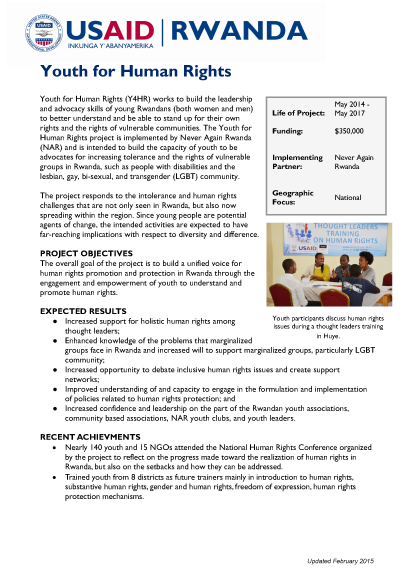Youth for Human Rights (Y4HR) works to build the leadership and advocacy skills of young Rwandans (both women and men) to better understand and be able to stand up for their own rights and the rights of vulnerable communities. The Youth for Human Rights project is implemented by Never Again Rwanda (NAR) and is intended to build the capacity of youth to be advocates for increasing tolerance and the rights of vulnerable groups in Rwanda, such as people with disabilities and the lesbian, gay, bi-sexual, and transgender (LGBT) community.
Youth for Human Rights ![]() (pdf - 215k)
(pdf - 215k)
The project responds to the intolerance and human rights challenges that are not only seen in Rwanda, but also now spreading within the region. Since young people are potential agents of change, the intended activities are expected to have far-reaching implications with respect to diversity and difference.
Project Objectives
The overall goal of the project is to build a unified voice for human rights promotion and protection in Rwanda through the engagement and empowerment of youth to understand and promote human rights.
Expected Results
- Increased support for holistic human rights among thought leaders;
- Enhanced knowledge of the problems that marginalized groups face in Rwanda and increased will to support marginalized groups, particularly LGBT community;
- Increased opportunity to debate inclusive human rights issues and create support networks;
- Improved understanding of and capacity to engage in the formulation and implementation of policies related to human rights protection; and
- Increased confidence and leadership on the part of the Rwandan youth associations, community based associations, NAR youth clubs, and youth leaders.
Recent Achievements
- Nearly 140 youth and 15 NGOs attended the National Human Rights Conference organized by the project to reflect on the progress made toward the realization of human rights in Rwanda, but also on the setbacks and how they can be addressed.
- Trained youth from 8 districts as future trainers mainly in introduction to human rights, substantive human rights, gender and human rights, freedom of expression, human rights protection mechanisms.








Comment
Make a general inquiry or suggest an improvement.